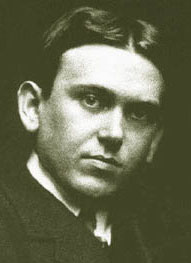Henry Louis Mencken frasi celebri
“La democrazia è una forma di religione. È l'adorazione degli sciacalli da parte dei somari.”
Citato in Le Formiche, § 1814
The Sceptic, da The Smart Set, maggio 1919
Frasi sulla religione di Henry Louis Mencken
Trattato sugli dei
Trattato sugli dei
Trattato sugli dei
Henry Louis Mencken Frasi e Citazioni
Trattato sugli dei
Trattato sugli dei
Trattato sugli dei
Trattato sugli dei
“La coscienza è la voce interiore che ci avverte che qualcuno potrebbe vederci.”
Citato in Le Formiche, § 1871
Henry Louis Mencken: Frasi in inglese
“Faith may be defined briefly as an illogical belief in the occurrence of the improbable.”
Origine: 1920s, Prejudices, Third Series (1922), Ch. 14 "Types of Men" - 3 : The Believer
Origine: Prejudices: Third Series
“We are here and it is now: further than that, all human knowledge is moonshine.”
1940s–present, A Mencken Chrestomathy (1949)
Origine: A Mencken Chrestomathy
36
1940s–present, Minority Report : H.L. Mencken's Notebooks (1956)
323
1940s–present, Minority Report : H.L. Mencken's Notebooks (1956)
Origine: Minority Report
“Every decent man is ashamed of the government he lives under.”
1940s–present, A Mencken Chrestomathy (1949)
“Misogynist — A man who hates women as much as women hate one another.”
1940s–present, A Mencken Chrestomathy (1949)
222
1940s–present, Minority Report : H.L. Mencken's Notebooks (1956)
Origine: Minority Report
In Defense of Women (1918)
1910s
Variante: The whole aim of practical politics is to keep the populace alarmed (and hence clamorous to be led to safety) by menacing it with an endless series of hobgoblins, all of them imaginary.
Origine: In Defense Of Women
Contesto: Civilization, in fact, grows more and more maudlin and hysterical; especially under democracy it tends to degenerate into a mere combat of crazes; the whole aim of practical politics is to keep the populace alarmed (and hence clamorous to be led to safety) by menacing it with an endless series of hobgoblins, most of them imaginary.
“Giving every man a vote has no more made men wise and free than Christianity has made them good.”
394
1940s–present, Minority Report : H.L. Mencken's Notebooks (1956)
Contesto: The highfalutin aims of democracy, whether real or imaginary, are always assumed to be identical with its achievements. This, of course, is sheer hallucination. Not one of those aims, not even the aim of giving every adult a vote, has been realized. It has no more made men wise and free than Christianity has made them good.
'Notes On Journalism' http://books.google.com/books?id=52L2eI9mwlcC&q="No+one+in+this+world+so+far+as+I+know+and+I+have+searched+the+record+for+years+and+employed+agents+to+help+me+has+ever+lost+money+by+underestimating+the+intelligence+of+the+great+masses+of+the+plain+people"&pg=PA28#v=onepage in the Chicago Tribune ( 19 September 1926 http://archives.chicagotribune.com/1926/09/19/page/87/article/notes-on-journalism)
The first sentence is often paraphrased as "No one ever went broke underestimating the intelligence of the American people." (The Yale Book of Quotations, 2006, p. 512)
1920s
Origine: Gist of Mencken
“A newspaper is a device for making the ignorant more ignorant and the crazy crazier.”
1940s–present, A Mencken Chrestomathy (1949)
369
Popular version of the first sentence: "The urge to save humanity is almost always a false-front for the urge to rule it."
1940s–present, Minority Report : H.L. Mencken's Notebooks (1956)
Origine: Minority Report
“Self-respect — The secure feeling that no one, as yet, is suspicious.”
1940s–present, A Mencken Chrestomathy (1949)
"Masculum et Feminam Creavit Eos," http://books.google.com/books?id=4cl5c4T9LWkC&q=%22No+matter+how+happily+a+woman+may+be+married+it+always+pleases+her+to+discover+that+there+is+a+nice+man+who+wishes+that+she+were+not%22&pg=PA337#v=onepage Ch. 30: Sententiæ http://books.google.com/books?id=VK0vR4fsaigC&q=%22No+matter+how+happily+a+woman+may+be+married+it+always+pleases+her+to+discover+that+there+is+a+nice+man+who+wishes+that+she+were+not%22&pg=PT1176#v=onepage
1940s–present, A Mencken Chrestomathy (1949)
As quoted in Charting the Candidates '72 (1972) by Ronald Van Doren, p. 7
1940s–present
Contesto: The state — or, to make the matter more concrete, the government — consists of a gang of men exactly like you and me. They have, taking one with another, no special talent for the business of government; they have only a talent for getting and holding office. Their principal device to that end is to search out groups who pant and pine for something they can't get and to promise to give it to them. Nine times out of ten that promise is worth nothing. The tenth time is made good by looting A to satisfy B. In other words, government is a broker in pillage, and every election is sort of an advance auction sale of stolen goods.
Baltimore Evening Sun (9 August 1926)
1920s
Origine: A Mencken Chrestomathy
" What I Believe http://www.unz.org/Pub/Forum-1930sep-00133" in The Forum 84 (September 1930), p. 136
1930s
Contesto: Men become civilized, not in proportion to their willingness to believe, but in proportion to their readiness to doubt. The more stupid the man, the larger his stock of adamantine assurances, the heavier his load of faith.
“The great artists of the world are never Puritans, and seldom even ordinarily respectable.”
Origine: 1910s, Prejudices, First Series (1919), Ch. 16
Contesto: The great artists of the world are never Puritans, and seldom even ordinarily respectable. No virtuous man — that is, virtuous in the Y. M. C. A. sense — has ever painted a picture worth looking at, or written a symphony worth hearing, or a book worth reading.
